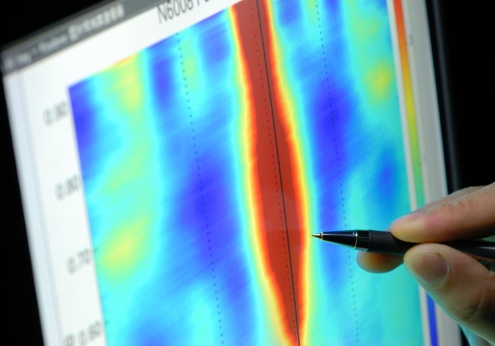

EEG stands for a big word: electroencephalographic. In English? EEG technicians are men and women who use EEG technology to study the electrical activity of the brain. Some EEG techs may be called END (electroneurodiagnostic) technicians, but both are responsible for preparing and administering EEG tests as ordered by the patient’s physician. Healthcare is one of the fastest growing sectors of employment in the U.S. and is estimated to increase by 116% by 2018. EEG or END technicians will play a key supportive role in this expansion and can expect a solid career outlook. EEG technicians may work in a variety of settings including hospitals, clinics, epilepsy treatment centers, sleep study programs and much more.
While EEG techs may perform a variety of screenings, the electroencephalogram (EEG) test is the most common. Typically a physician or health practitioner will order the exam and the EEG technician will be responsible for educating the patient about the test, applying any diagnostic tools (like electrodes to the patient’s scalp) and administering the exam as they watch for abnormalities in the patient’s brain wave patterns. The results are then reported to the ordering doctor who will determine how to best care for the patient. END technicians may also test nerve function in other areas of the body besides the brain.
According to others in the field, the most important quality EEG technicians need is the ability to make the patient comfortable. Muscle tension can translate into the waves that are recorded by the EEG and could skew the results. In addition, technicians need to be able to adjust to today’s healthcare atmosphere with flexibility, solid intrapersonal and communication skills, and the ability to think critically when necessary.
Understanding the positive and negative points of any career is important before you begin training. As with any job, there are many factors to consider before deciding if a career as an EEG tech is right for you. Here are a few points to think about.
To become an EEG tech, you will need to start out with a high school diploma or GED and obtain CPR certification. CPR is a standard requirement for any healthcare worker. From there, some employers will hire you and agree to train you on the job—you will learn as you go, but this is less common in today’s world of certifications and education. It is recommended that you attend a program that is accredited—or approved for quality—by the Commission on Accreditation of Allied Health Programs. These programs can be found at your local community or technical college and usually take between one and two years to complete. Most EEG courses are not offered online.
Once you complete your education, you can start to work and begin focusing on the next stage of your career—becoming certified in your field. Certification simply means that you have studied for and passed a national examination in your field of study. By certifying, you show others your commitment to quality care and professionalism. To be eligible for the certification exam you will need to complete three years of clinical time/work experience and then apply for the exam through the American Board of Registration of Electroencephalographic and Evoked Potential Technologists (ABRET).
If you are looking for a career that will bring in a lot of money, EEG technician work probably isn’t it. While you can certainly make a solid living, you shouldn’t expect a six-figure salary. Many in the field say they took the job because of an interest in the brain’s function, to work with people, or convenient training schedules, but they still bring in a decent income. EEG techs make about $47,000 a year. This is an average—with the lowest ranking numbers at around $24,000 and the upper end at near $70,000 per year. Salary will vary widely depending on your years of work experience, where you live, and the type of facility that employs you.
EEG technicians share similar responsibilities with END technicians, but with some differences. END techs are able to do a few more types of tests than EEG techs. Both are trained to administer EEGs but END techs go beyond with skills to assess the nerves of the body and their relationship to the brain. They may also track brain wave activity during surgical procedures, nerve conduction studies, sleep studies and more. END techs make more money than EEG techs do starting out—between $38,000 and $47,000. Educational requirements to become an END are slightly more than EEG technicians and are required to earn an associate’s degree and certify in the field once practice requirements are met.


Traveling allied health jobs are a great option for EEG technicians who want to see and experience new places. While some travel assignments can be very close to home and others across the country, EEG techs who sign up for travel work can expect higher pay, paid travel and housing expenses and the chance to work with some of the best medical teams in the country. Technicians who choose this option should be prepared to think on their feet and feel comfortable working independently. There is often little to no orientation to a facility when traveling so techs should have a solid work experience and a positive attitude.
By Rachel Ballard RNC, BSN
 Rachel Ballard
Rachel Ballard
Rachel Ballard is a certified registered nurse and owner of the medical writing company iHealth Communications. iHealth teams with healthcare leaders to create written content that boosts revenue and builds relationships. Learn more about Rachel on Google+
Salary sources: *Bureau of Labor Statistics ** CNN Money